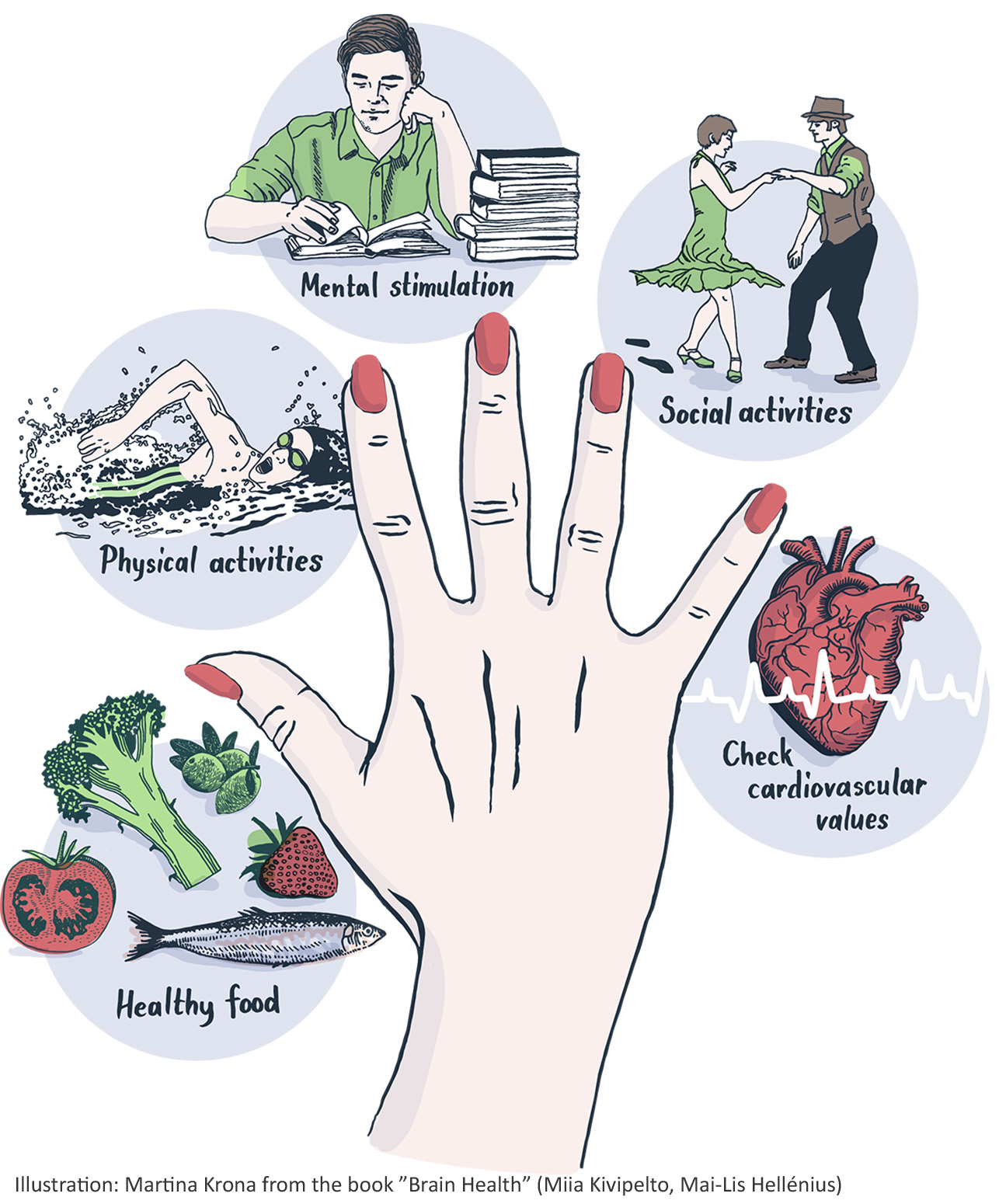prevention of cognitive decline
The FINGER model is based on scientific evidence from the FINGER study, showing that simultaneous lifestyle measures in five areas can help prevent and delay the development of cognitive decline.
Several different risk and health factors can affect our likelihood of developing cognitive impairment and dementia. It is therefore important to apply a multimodal approach and try to involve all five “fingers” daily: a healthy diet, physical activity, cognitive stimulation, social activities, and the monitoring of risk factors related to cardiovascular disorders.
The latest research shows that at least 40% of all dementia cases are linked to modifiable lifestyle and environmental factors. Since the biological processes that may lead to dementia can start already 20-30 years before the diagnosis is made, it is never too early to start implementing these good habits. The same factors can also help in slowing down these processes, so it’s also never too late.

Healthy food
What is good for your heart is also good for your brain. The FINGER diet model follows the Nordic Nutrition Recommendations. They are based on the same principles as the well-known Mediterranean diet. In numerous international studies over many years, the Mediterranean eating pattern has been linked to lower risk of both cardiovascular diseases and neurodegenerative disorders like cognitive decline.
A nutritious, varied diet and daily physical activity are good for both your brain and your heart. This is visualized by the food pyramid.
The base of the food pyramid is rich in vegetables, legumes, root vegetables, berries, fruits, whole grains, nuts, and seeds. Use oil as your preferred fat. Enjoy fish and seafood several times a week, as well as some chicken, eggs, and dairy products. Be sparing with charcuterie, red meat, and sweets. Water is the best mealtime drink.
The pyramid rests on a foundation of physical movement, recovery, and community around cooking and meals.

Physical activity
Regular exercise is essential for our mental and physical health. Physical activity is one of the dementia-preventive factors with the strongest evidence, and it is most beneficial when it includes both cardio exercise and muscle strength training. It has positive effects on almost all risk factors that can cause cardiovascular diseases and cognitive impairment. It has anti-inflammatory and growth-stimulation effects on the entire body, including the brain.
A Finnish study, CAIDE, was the first study to show that regular physical activity, in leisure time, at middle age is associated with 50% reduction of risk of developing dementia 20 year later. Physical activity was defined as a minimum 30 minutes of training 2-3 times per week, to the point of becoming sweaty or short of breath. Follow-up studies showed that increasing one’s physical activity level, and maintaining it, after middle age had long-term positive effects also for those who had earlier been more passive and sedentary.
The movement pyramid shows what activity levels are recommended to protect the heart, blood vessels, and brain. The day-to-day movements, like walking, cycling, cleaning and playing with the kids, can be found at the base of the pyramid. Avoid sitting still for long periods of time. The second level of the pyramid shows that we need to exercise, move more intensely, for 150-300 minutes per week. All muscle groups should be engaged, and activities should be spread out over the week.
The top of the pyramid reminds us that there should be elements of strength training 2-3 times per week.

Mental stimulation
Our brains can and should be exercised throughout our lives. There is evidence that cognitive stimulation at any time of life reduces the risk of cognitive impairment and dementia. Thanks to the brain’s plasticity and adaptability, our cognitive reserve can be strengthened at any age. In the FINGER study, cognitive training was computer based and focused on working memory, long-term memory, attention, and speed. We could see that the participants did not only become better at the cognitive tasks they were trained at, but also at tasks that were similar to their main tasks.
Education, occupation and leisure activities all contribute to our cognitive health. Activities like playing games, attending courses, reading books, going to theaters or museums, and being active in associations all stimulate our brain. After retirement, it is advisable to look for brain training that compensates for the work-related daily cognitive stimulation. Puzzles, crosswords, and building things are all good day-to-day brain training. Learning and using some memory strategies can be helpful in our daily lives and contribute to maintaining our cognitive capabilities.

Social activities
Many studies have shown that social activities and social engagement can reduce the risk of cognitive impairment. It is good for our brain health to socialize with friends and feel part of a social context. Close relationships may be more important than the size of our social network. There are also differences between feeling alone and actually being alone. Many who live alone don’t feel lonely. However, for someone who does feel lonely, it is advisable to find ways to decrease one’s isolation, for instance by actively trying to deepen existing relationships, or finding new friends through hobbies, interests, associations or perhaps voluntary work.
To this “finger”, we also count the necessity of relaxation, sleep, and stress-reduction. To function well, our brains need rest and time to recover. How we do this can be individual. We are all different and unwind in different ways.

Control of cardiovascular risk factors
Having control of cardiovascular risk factors like blood pressure, cholesterol, blood glucose, and body weight is very important also for our brain health. Again, what is good for our heart is good for our brain. It is important to monitor and treat any such disorders at any age. Research has shown that high cardiovascular values and obesity at middle age increase the risk of dementia later in life.
In addition to treating cardiovascular conditions with medication and lifestyle changes, it is highly recommended not to smoke. It is never too late to stop! Quitting smoking can help reduce the risk of dementia even if you quit later in life.


